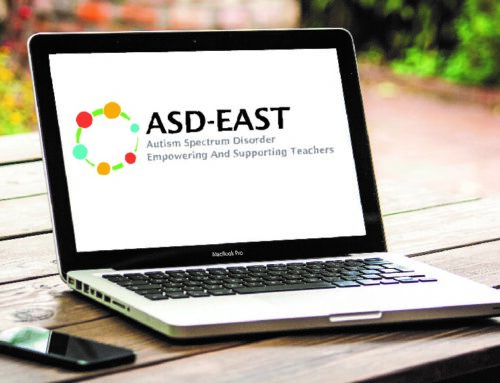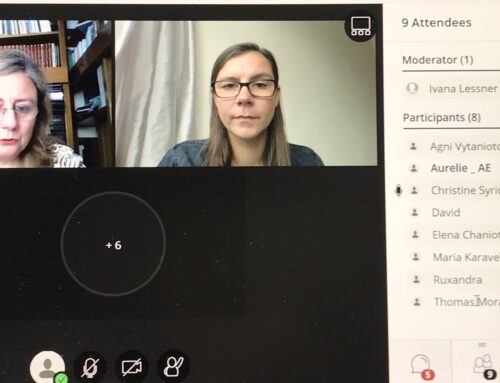Over the last months of 2019, the ASD-EAST Autism Teacher Training Curriculum and Programme has been testing with more than 300 professionals in North Macedonia, Poland, and Croatia. The following lines provide a better understanding on how the training has been developed on the basis of an initial Mapping report, undertaken by the academic partners within the ASD-EAST project.
Back in May 2019, academic partners released the first output of the project: the ASD-EAST Mapping Report. It features the strengths, challenges, barriers, and opportunities regarding educator training on autism, good practice, and the provision of such training (both country-specific and EU-wide).
Threfore, the curriculum and training materials developed address the challenges, and identify needs through raising knowledge, understanding, and practical skills of specialist teachers. To respond to the needs of teachers adequately, the curriculum contains parts that are specific for mainstream or special settings, allowing for modified application depending on the local context of each country.
More information about the local context of Poland, North Macedonia, and Croatia
The strengths and challenges in current autism teacher training…
…in North Macedonia
Since 2018 and 2019, the university trainings in North Macedonia offer an elective course at the Institute of Special Education and Rehabilitation in the third year of the undergraduate studies. On the graduate level, an introductory course is offered for students of Autism and Intellectual disabilities programme. However, not all students continue to the graduate level.
The challenges include a lack of translated literature in the local language, which means that students refer mainly to one (Serbian) author. During the course students visit non-governmental organisations for autism providing them with practical experience. The issue is that these centres have established their own curricula which have not been evaluated, so there is no quality control of the taught methods.
…in Poland
Initial teacher training in Poland for special pedagogues includes 90 hours of a more general course on how to work with autistic children and another 90-hour course of ABA. For teachers preparing for teaching in mainstream schools or professionals in early childhood intervention, there is a compulsory 90-hour Autism-specific course.
There are several trainings in Poland offered as further education for professionals working with children on the autism spectrum.
…in Croatia
The education system in Croatia consists of mainstream and special schools. Children may attend nurseries and kindergartens from 1-6 years old. At the age of 7 they enter primary school. There are several options for children on the spectrum.
The settings available are:
- a mainstream class
- a partially mainstream, partially special class
- a special class
- an upbringing and education group.
Autistic students may follow one of these educational programs:
- a mainstream programme with individualized procedures
- a mainstream programme with adjustments of content and individualized procedures
- a special programme with individualized procedures
- a special programme for gaining competencies in life skills with individualized procedures.
Challenges that were identified in the education of students with autism include lack of criteria for inclusion in different programs and no transition planning. Mainstream teachers often lack knowledge and skills to work with students on the autism spectrum and they receive no support or supervision.
| NORTH MACEDONIA | POLAND | CROATIA | |
| STRENGTHS | – elective course offered at the university
– more opportunities on graduate level – variety of courses offered by private companies and NGOs |
– compulsory university courses include up to 180 hours of Autism training for specialist teachers
– diversity of further trainings provided by the university and private organisations |
– university courses offered to specialist teachers (up to 240 hours) |
| CHALLENGES | – few teachers continue onto graduate level
– government provided course of further education is not specific to Autism – cost of trainings |
– cost of trainings
– teachers need to travel far for trainings |
– the quality of practical experience as part of training
– strategies for mainstream schools – one approach trap – no compulsory further training |
Responding to teachers’ needs in the ASD-EAST curriculum
The study was undertaken gathering both quantitative survey data and qualitative focus group data, gathered from a total of 294 teachers from both mainstream and special education.
One of the key findings of the study shows that almost 90% of the teachers would benefit from training. Training with regard to theoretical information was identified as least important, but was still seen as relevant by more than half of teachers. Practical strategies, particularly those relevant to teachers’ own settings were identified as of high importance, as was supervision and the acquisition of tools and resources. Teachers expressed a strong desire to undertake self-experiential learning.
ASD-EAST was therefore established to address this shortfall, and to focus on developing appropriate training to support effective teaching to ensure the inclusion of autistic learners within this region. The ASD-EAST training curriculum responds to the needs of specialist teachers in Croatia, North Macedonia and Poland to improve the skills and enhance competences for working with students on the autism spectrum in mainstream and special settings.
This is an innovative output in that no such model curriculum has been developed with a focus on supporting the development of specialist teachers’ knowledge and skills to further the education and inclusion of children with autism within this region of Europe.
| Identified challenges and training needs | Response in the ASD-EAST training curriculum |
| Managing challenging behaviour | => Module on Managing challenging behaviour
=> 2 Modules explain how understanding and meeting the needs of autism children may prevent challenging behaviour |
| Low confidence in applying strategies for working with autistic children | => Improved practical skills and raised understanding of specialist teachers will enhance their competences and feelings of self-efficacy, serving as prevention against burn-out and fulfilling the perceived need for supervision by experts |
| Collaboration with parents and other professionals | => Each module contains practical tips on how to communicate the learned strategies with parents, teachers and teaching assistants
=> Improved knowledge and understanding of strategies for working with autistic children will raise the skills of specialist teachers in communicating the significance and application of these strategies |







